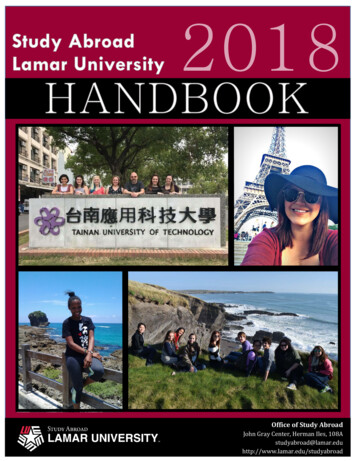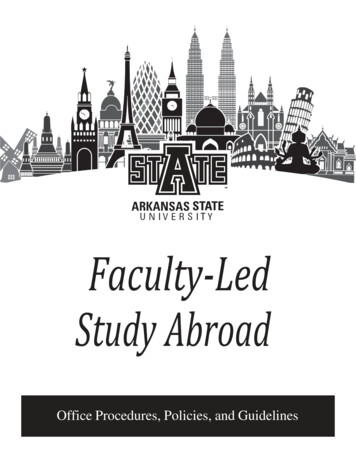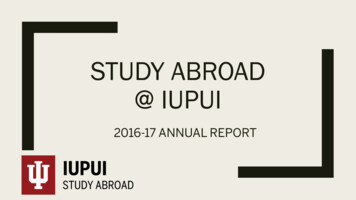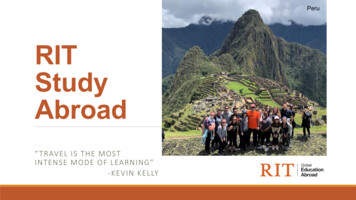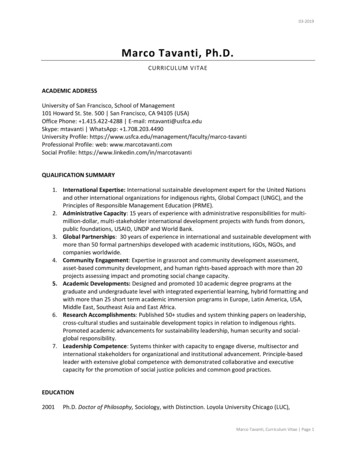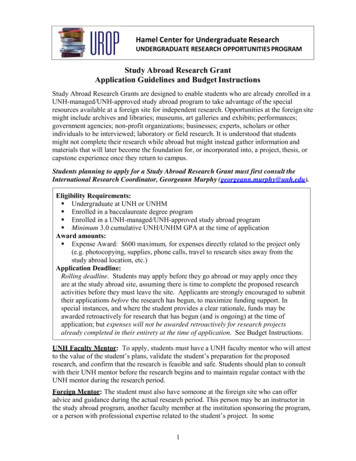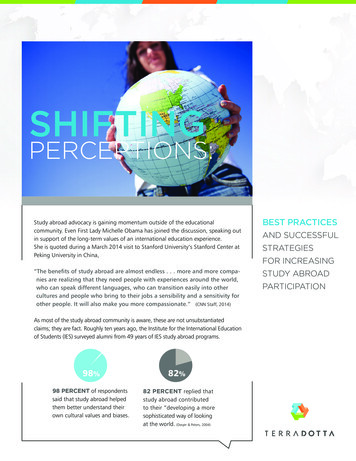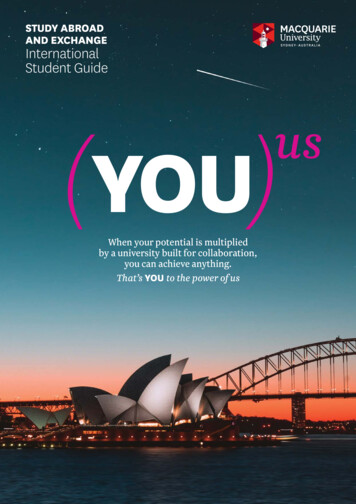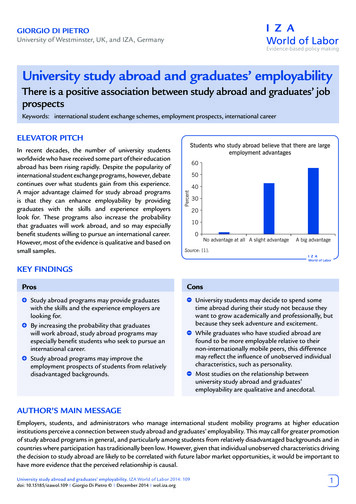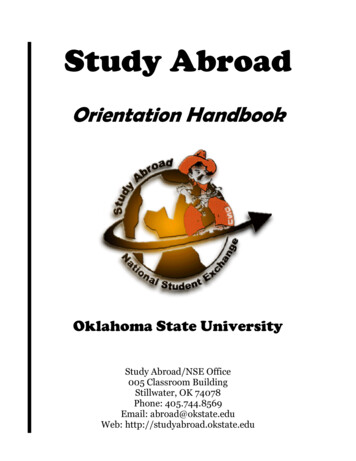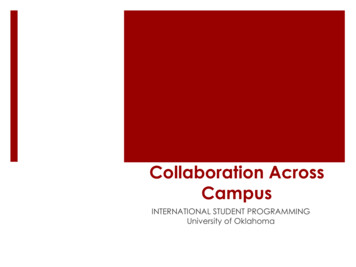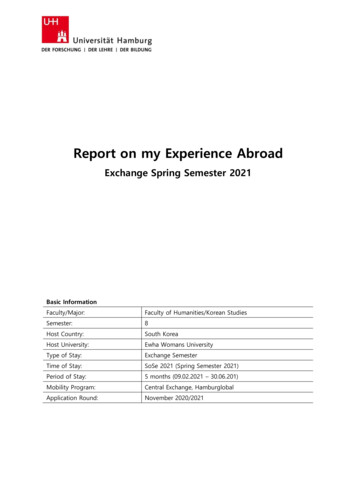
Transcription
Report on my Experience AbroadExchange Spring Semester 2021Basic InformationFaculty/Major:Faculty of Humanities/Korean StudiesSemester:8Host Country:South KoreaHost University:Ewha Womans UniversityType of Stay:Exchange SemesterTime of Stay:SoSe 2021 (Spring Semester 2021)Period of Stay:5 months (09.02.2021 – 30.06.201)Mobility Program:Central Exchange, HamburglobalApplication Round:November 2020/2021
Content1. Preparation & Arrival 11.1. Visa1.2. COVID-19 & Quarantine1.3. Health Insurance2. Funding 32.1. Financial Support2.2. Finances2.3. Tips3. Accommodation .43.1. Dormitory Types3.2. Dormitory Check-in3.3. Pros and Cons of living at Ewha’s Dormitory4. My Stay Abroad: General Information .54.1. Routes & Distances between Facilities and Accommodation Transport4.2. Formalities4.2.1. Foreigner Registration Card (FRC)4.2.2. Bank Account4.2.3. Sim Card4.2.4. Korean Language Requirements5. My Stay Abroad: Studies .75.1. Curriculum5.2. Contacts6. Daily Life & Free Time .87. Conclusion .98. Photos 10
1. Preparation & ArrivalAs a Korean Studies major, an exchange semester in South Korea, including a Korean languagecourse, is mandatory. Applying to Ewha Womans University through the Central Exchange Programwas suggested to me by my professor, who assisted me throughout the application process (e.g.selecting courses, writing a letter of recommendation, signing and stamping required documents,etc.). Furthermore, all the necessary instructions and forms needed for the successful applicationcan be found on the Central Exchange’s website and easily uploaded through Mobility. In case offurther questions, I could always contact the Study Abroad Team, upon which I received quick andhelpful response.1.1. VisaStaying in Korea for more than 90 days with the purpose of studying requires the D-2 student visa,for which I applied at the Korean consulate in Dubai. It took exactly 14 days to issue my visa, andit cost 360AED (82 ). Ewha sent their official letter of acceptance along with other documentsneeded for the visa application via email only instead of per post due to the delay in shipmentscaused by Covid-19 (it was sufficient for the consulate nonetheless).However, Ewha sent those documents relatively late compared to other Korean universities, barelymaking it in time for my visa appointment and adding a little stress. After eventually receiving myvisa in time, I flew to Seoul 3 weeks before the semester began, leaving enough time for a 14-dayquarantine and orientation week. I took a direct flight from Dubai To Seoul via Emirates Airlines,and the round-trip ticket cost around 4,000AED (923 ), providing 30kg of checked-in luggage anda 7kg cabin bag. For an extra fee of about 1,000AED (230 ) I had an additional 15kg of luggage toand from Seoul.1.2. COVID-19 & QuarantineDue to Covid-19, several changes and adjustments had to be made. First and foremost, I could notproceed with my initial application at Central Exchange and Hamburglobal for Fall Semester 2020since traveling abroad at that time was banned. I had to freeze my application till the followingSpring Semester 2021, but a new application was not needed. Instead, I had to einigung) or list of courses.Moreover, as previously mentioned, I had to add an extra two weeks to my travel plan in order toconduct a 14-day mandatory quarantine. Though Ewha suggests a governmental quarantine facility,I found it too expensive (1,108 for 14 days including daily meals) and privately booked an Airbnbinstead (580 ), which was kindly covered by Hamburglobal as “extra costs due to Covid-19”.Additionally, I had to take a PCR test before flying to Seoul, before and after quarantine, and beforeleaving Seoul.1
Upon arriving at Incheon Airport, I had to undergo many Covid-related procedures. I had to standin multiple queues to get my temperature checked, have my quarantine address confirmed byofficers who called my Airbnb host, download a mandatory quarantine app that tracks my locationduring isolation, etc. Overall, it took about 4-5 hours after landing until I was able to leave theairport.Furthermore, there was a special transportation system designated to quarantined travelers. Afterarriving and completing all steps at the airport, travelers are escorted to the health center locatedin the same district as their quarantine facility. There, they take a PCR test free of charge and arethen transported to their address. There are three ways to do this: 1) Ride the designated quarantinetaxi, which takes you to the health center, waits for you to take the PCR test, and then takes youto your quarantine facility ( 70,000- 90,000). 2) Ride the bus from the airport to the health center,take the PCR test, and be transported by another van to your quarantine facility ( 16,000). 3) Bepicked up privately by friends or family, take the test, and directly go into quarantine.In case of late arrival, one must head to their quarantine facility first and then take the PCR test thenext day. Going to the health center the next day can only be done through a quarantine taxi, asusing public transportation while quarantined is not permitted. A quarantine taxi can be bookedonline (https://www.enkor.kr/taxi/), and it waits for you to take the test and brings you back( 10,000 per 30 minutes). The same has to be done again about two days before getting out ofquarantine. Ewha well provides all this information in advance as PDF brochures and PPTs, and theairport staff also provides all the instructions needed.During quarantine, one must submit four health surveys daily, where the body temperature andoverall health condition are checked. Two are through the quarantine app downloaded at theairport, and two are through a google link provided by Ewha. If not submitted, one is contacted byan official or by Ewha through phone call or Kakaotalk to make sure everything is okay.Moreover, although online grocery shopping and food delivery are widespread in Korea and veryconvenient, it is hard to access any form of Korean online banking before obtaining the ForeignerRegistration Card (FRC). Most applications and websites do not accept foreign credit cards and arein Korean language only. However, I recommend two options that do accept foreign credit cardsand are in English: 1) Shuttle application for food delivery and 2) SSG.com for online (grocery)shopping.1.3. Health InsuranceWhen applying at Ewha, one must submit proof of health insurance. You can either apply forthe Ewha Collective Insurance, which is 24,000KRW for 1-semester-students (valid for 6 months)and 44,000KRW for 1-year-students (valid for 12 months), or submit proof of international healthinsurance from your home country, which offers similar coverage to Ewha’s insurance.2
Additionally, the National Health Insurance (NHI) has become mandatory for international studentssince March 1st, 2021. It is additional to the Ewha Collective Insurance or the one from your homecountry and is 39,450KRW per month. Though it is possible to apply for NHI only, it is not sufficient,as it does not cover many important aspects, especially accidental death-related benefits. Therefore,it is strongly recommended to have an additional insurance plan such as Ewha’s or from your homecountry. In some cases, students can ask to be exempted from NHI if they provide proof of anotherinsurance with more coverage than NHI, which must be translated into Korean.2. Funding2.1. Financial SupportWhile applying at Central Exchange, I was informed about Hamburglobal, a funding programdesigned to financially support students during their stay abroad. The application process is almostidentical to the one of Central exchange, as the required documents are the same. I received 1,800 for one semester while I was in quarantine, and later an additional 581 for my quarantine costs.Besides Hamburglobal, I did not receive any other financial support.2.2. FinancesThe following is an overview of some prices and monthly expenses:-Quarantine facility: 581 for 16 days (Airbnb)-Dorm room*: 2,698,190KRW per semester / 27,438KRW per night (I stayed an extra 6 nights)-Sim card: 50,000KRW for 4 months / 10,000KRW per additional month-Health insurance: 24,000KRW per semester 39,450KRW per month (4 months)-FRC: 30,000KRW-PCR test for departure: 110,000KRWMonthly expenses** excluding dorm:-Feb: 540,000KRW-Mar: 610,000KRW-April: 820,000KRW-May: 1,000,000KRW-Jun: 950,000KRW*Dorm rooms are assigned randomly and prices start from 1,507,100KRW.**Monthly expenses include an average of 2 meals at a restaurant daily, coffee, groceries, publictransport (subway, bus, taxi), household items, toiletries and personal products, clothes, travelexpenses (domestic flights, bus, train, accommodation, etc.), entertainment, hair salon, and more.3
2.3. TipsThe following is an overview of some prices and monthly expenses: Eating at local restaurants isfairly cheaper than cooking at home, as groceries (especially fruits and vegetables) are relativelyexpensive. Cafes, on the other hand, can get pricey. Shopping is average but local shops near Ewhaor Hongdae, for example, are very affordable. Transportation is super cheap, including subway, taxis,and even domestic flights.3. Accommodation3.1. Dormitory TypesThere are three dormitories at Ewha Womans University: I-House, E-House, and Hanwoori House.Exchange students are usually admitted into I-House, which has five buildings (A-E). Only A, B, andC are for exchange students. Buildings A and B are joined and are a little older, while C (also calledEwha Samsung International House) is newer and more expensive. Each of the buildings has facilitiessuch as laundry and ironing rooms, computer rooms with printers, study rooms, a commonroom/lounge for guests, and a gym (currently closed due to Covid-19). The housing office is inbuilding A/B, and the big common kitchen is in building C but can be used by residents of buildingsA/B.Moreover, each floor in each building has shared bathrooms and showers, as well as a smallkitchenette equipped with a kettle, microwave, small toaster oven, and hot/cold water dispenser.The rooms have a bed with mattress and pillow, bedding and pillowcase (blanket can be rented athousing office), desk and chair, storage space, closet (no hangers), a small fridge, floor heating, andair conditioner.The following is an overview of different room types and prices per semester:Building A/B:-Single room with en-suite bathroom: 1,871,720KRW-Single room with shared bathroom: 1,507,100KRW-Double room* with en-suite bathroom: 1,871,720KRWBuilding C:-Single room with en-suite bathroom: 2,698,190KRW-Double room* with en-suite bathroom: 2,698,190KRW-Double room* with shared bathroom: 2,698,190KRW*Double rooms are assigned to one person only due to Covid-19.Disclaimer: Students do not get to choose which room they want. Rooms are assigned randomlyand cannot be changed.4
3.2. Dormitory Check-inOne can check in on the official check-in day or any other day during office hours, but early checkin is unavailable. To check into the dorms, a negative PCR test and a tuberculosis test are required.The PCR test can be the same as the one done before ending quarantine if it is not older than fivedays. You can take the tuberculosis test in your home country or at a health center in Korea. Irecommend the latter, as it is more convenient and affordable. There is a health center at SinchonStation Exit 6 called 대한의료영상의학과의원 (02-717-3305). The test costs 15,000KRW, and you cancollect the result right away.3.3. Pros and Cons of living at Ewha’s DormitoryPros:-Excellent location: central (nearby restaurants, cafes, shops, convenience stores), easytransportation (nearby subway and bus stations)-Campus life: meeting other exchange students and making Korean friends, cafeteria, library-Facilities: laundry and ironing room, kitchen, computer room with printer, vending machines-No curfew-Cleanliness-Privacy-SafetyCons:-Less freedom and independence: there are many rules (e.g. must inform the housing officeabout staying out overnight, must wear a face mask when using common areas, no guestsare permitted, etc.)-Daily Health survey: checking body temperature and symptoms daily-Demerit points: if one does not abide by the rules, they receive demerit points, and once acertain amount of demerit points is reached, students can be evicted-Frequent announcements by the housing office through central speakers, usually around 9am or 9 pm can get annoying-Occasional noise by other students late at night, cleaning staff very early in the morning,or nearby kindergarten4. My Stay Abroad: General Information4.1. Routes & Distances between Facilities and Accommodation Transport5-5min walk from I-House to ECC (main building)-8-10min walk from I-House to nearby restaurants, cafes, shops, and bus stops-13-15min walk from I-House to Ewha Womans University Subway Station (이대역)
-25min walk from I-House to Sinchon (nearby busy area with lots of restaurants, cafes,shopping centers and a big Emart for groceries)Public transportation is very well and conveniently designed. The subway is very affordable, and itslines go everywhere, including areas outside of Seoul. Buses are also inexpensive but not convenientduring rush hour due to traffic jams. Taxis are cheap and good to reach more remote places withfew transport options. They are good to share but can also get stuck in traffic jams. Bikes are notas convenient as in Germany since most of the time there are no proper bikeways, except at parks,and there are too many people on the street.4.2. Formalities4.2.1. Foreigner Registration Card (FRC)Any person willing to reside in Korea for more than 90 days must apply to obtain the ForeignerRegistration Card within 90 days of their arrival. I recommend doing so as soon as possible, as theFRC facilitates many things like permitting the exit from and re-entry to Korea, serving asidentification, opening a bank account and online banking, etc. To get the FRC, you should applyfor an appointment at the immigration office, where you submit the required documents and paya fee of 30,000KRW.The required documents include the application form, passport, color ID photo, certificate ofstudentship (provided by Ewha in student package), and proof of address. The whole process takesabout a month from the appointment date, and the card can be picked up personally or deliveredto your address. In case you move to a new address or get a new passport while in Korea, youmust report to the immigration office within 15 days, upon which they will apply any changes toyour FRC. All detailed instructions are provided by Ewha as PPTs during orientation week.4.2.2. Bank AccountOpening as well as closing a bank account is very simple and straightforward. I opened mine atShinhan Bank campus branch, which made the process extra easy for exchange students. I receivedthe application form and required documents in my student package provided by Ewha, and it alsocontained all the instructions on how to open a bank account on campus. Though your passport isenough to open a bank account, online banking can only be accessed if you register your FRC. Inthis case, the order of your name on the FRC has to be identical to the one you opened your bankaccount with (last name first, then given name).Additionally, your phone number should also be registered with the FRC and not with the passport.Opening the account takes about two weeks, while closing it can be done on the same day. Ipersonally recommend opening a bank account, even if it is just for one semester, as card paymentsare preferred in most places, and some places don’t even accept cash at all.6
4.2.3. Sim CardHaving a Korean phone number is essential. It is needed for all the above-mentioned steps andprocesses. I got mine on a group offer at an SK Telecom shop in Hongdae. If you buy it with agroup of 3 people or more, it costs 50,000KRW for four months. 10,000KRW sim card fee and40,000KRW for unlimited data and free calls within Korea. The shop location is 10, Hongik-ro, Mapogu, Seoul 04055 near Hongdae Station Exit 9. The FRC is not needed to get a sim card there, asyou can use your passport. However, I recommend going back there and registering your FRC afterreceiving it to be able to apply for online banking at the bank.4.2.4. Korean Language RequirementsBasic Korean skills are definitely needed for everyday communication, as most people, especiallyelders, do not speak English. It is mainly required to communicate at cafes or restaurants whenordering since many menus are in Korean only, but also to communicate with locals when askingfor directions or with taxi drivers. However, touristic places do have English-speaking staff, and mostyoung Koreans have no trouble communicating in English. Signs and announcements in buses andsubways or at public touristic places are usually in Korean and English, so it is easy to get aroundeven with little Korean language skills.5. My Stay Abroad: Studies5.1. CurriculumDuring my semester at Ewha, I attended two courses which were both online: 1) Korean III (6 credits)and 2) Everyday Life in Modern Korea (3 credits). Korean III was an intensive language course thatwas more advanced and demanding than the Korean language courses I had at UHH. It was threehours a day, four times a week, and it was taught by two Korean teachers. We had a total of fourbooks, two of which were workbooks. We finished the first book and workbook Ewha Korean 31 before the midterms and continued with Ewha Korean 3-2 after the midterms until the finals.Additionally, we had about 30 worksheets for each half of the semester. Each of the books andworkbooks was divided into 7 to 8 lessons, and each lesson had four parts: grammar, listening,speaking, and writing. In one semester, we learned a total of 60 grammar rules while focusingmore on speaking and writing but less on vocabulary. We had regular assignments and quizzes andtwo main exams, the midterms, and finals. The lectures were on Zoom, while assignments andquizzes were on Cyber Campus or Google Classroom. Even the midterm and final exams wereonline, and they consisted of a reading and writing exam and an oral exam, both held on differentdays. Overall, I noticed an enormous improvement in my Korean language skills within a short timeand really enjoyed the class.7
In the course Everyday Life in Modern Korea, we had to watch two lectures a week on Youtube andhad a short Zoom discussion once a week, where we review and discuss the lectures and readingsassigned. We also had regular assignments and one group presentation. Even in this course we hadmidterms and finals, which consisted of writing an essay. The topics discussed in this course werehighly interesting and very enjoyable.5.2. ContactsThe contact between exchange students and Ewha is very well established through the Office ofInternational Affairs (Ewha OIA) even before arriving in Seoul. They are always quick to respond andshow cooperation when needed. They are also really helpful in assisting exchange students withassimilation and integration by providing all necessary instructions and documents needed forthings like the bank, health insurance, dorms, etc., making the process of settling down muchsmoother.Meeting Korean students was more complex than usual due to Covid-19. However, through Ewha’sPeace Buddy Program, I was introduced to Korean students and was able to hang out with themoften. My Peace Buddy would take me to different Korean restaurants and introduce me to newfriends, which added fun to campus life.The contact between students and teachers was very casual and smooth. We could always text ourKorean class teachers through Kakaotalk and ask anything we wanted whenever we had questions.Though all lectures were online, our Korean class teachers made the effort to organize an offlinemeeting where we could introduce ourselves and get to know each other on a more personal level.They also prepared goodie bags for us filled with snacks and Ewha souvenirs. Overall, students canalways find strong support when needed.6. Daily Life & Free TimeI personally really enjoyed my lifestyle in Korea. There is so much to do and see and many uniqueways to make beautiful memories. I would often go to a café to study, as the café culture in Koreais very widespread. Trying out different Korean dishes at local restaurants was always a newexperience every time. Visiting touristic places is nice but also taking random walks in narrow alleyswithout having any expectations ends up being a magical experience. Seeing beautiful views andsceneries of gorgeous nature mixed with historical sites and modern buildings all at the samemoment is truly mesmerizing. Meeting new people every day, be it locals or other fellowinternational students, makes the whole experience richer and more memorable, which is why Irecommend to go out as much as possible. I also think traveling around Korea and visiting othercities such as Sokcho, Suwon, Busan, Jeju, etc., is a must.8
In terms of safety, Korea is one of the safest countries I have ever visited. I never worried aboutpickpocketing or such. I also had absolutely no experiences with racism or scams, though I knowvery few people who did slightly encounter things of these sorts. The locals are very friendly andhelpful, though some elders tend to sometimes stare at foreigners out of wonder.As for the weather, it is constantly changing. In February it was very cold and snowy withtemperatures like -9 C or -10 C. Every house is equipped with floor heating, but in my case, thefloor heating at my quarantine Airbnb was not warm enough and I needed extra warm clothes.From March to May it slowly becomes warmer with temperatures in the high 10s to low 20s. It isoften windy and rather chilly at night. In June the temperatures are very nice and refreshing with afew rather hot days. By the end of June raining season starts so it rains almost every day and canget very warm and humid.7. ConclusionIn conclusion, I would say this exchange semester is one of the best experiences I have had in mylife. I learned so much, academically and also personally, about myself and my preferences. I learnedto be more open to new experiences and more flexible. I learned to live without any expectationsand to be grateful for every day passing by while I get to make beautiful memories. I am veryhappy to see a massive improvement in my Korean skills, which would not have been possible if Ihadn’t interacted with locals on a daily basis. My stay in Korea inspired me to find a topic for mybachelor thesis but also to seek new goals for my next chapter in life. I am grateful for all the newfriends I got to make, the new people I got to meet, and for getting closer to the ones I alreadyhad in Korea. Overall, it is safe to say that this semester will remain one of the most memorabletimes in my life, and I would love to have the chance to do something like this again.9
8. PhotosJeongbang Waterfall, Jeju IslandArt Valley, Pocheon10Ingwansan, SeoulYeongeumjeong, Sokcho
Suwon Hwaseong, SuwonEwha Womans University, Seoul11Gamcheon Culture Village, Busan
As a Korean Studies major, an exchange semester in South Korea, including a Korean language course, is mandatory. Applying to Ewha Womans University through the Central Exchange Program . air conditioner. The following is an overview of different room types and prices per semester: Building A/B: - Single room with en-suite bathroom: 1,871,720KRW

